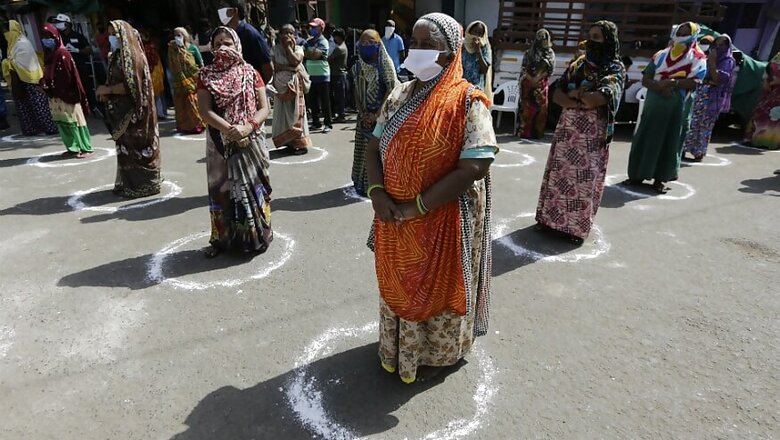
views
Since the start of the coronavirus pandemic, dozens of reports have suggested a sex-based differential immunity response to the treatment of Covid-19 and, more importantly, the degree and chances of the fatal infection. Studies have also found gender’s solid role in how a human body responds to the virus. Most of all these studies point towards the relationship between female sex hormones and a woman’s reduced vulnerability to infectious diseases. However, the major factor here is women’s most dreaded affliction – menstruation.
So, is there some relationship between coronavirus and menstruation? A recent research published in the MedPage Today found that non-menopausal patients experienced a shorter hospitalisation period, earlier discharge, and lower disease severity than menopausal patients. Another research published by a group in Italy hypothesised that oestrogen (E2 and synthetics such as ethinylestradiol) may act as a deterrent in a woman’s body.
News18 spoke to Dr Jaideep Malhotra, president of the South Asian Federation of Menopause Societies (SAFOMS), to understand if menstruation is a determining factor in Indian women and how the SARS-CoV-2 virus has an impact on the female anatomy.
Is Oestrogen the Modest ‘Protector’?
To begin with, one needs to understand what the female hormone ‘oestrogen’ is, as these terms are seldom included in the common parlance, despite their gigantic role in our immune system.
“Oestrogen is what we call the ‘female hormone’ and because of it we look the way we look and we behave the way we behave. It comes from the ovaries, where the eggs come from. The eggs have a number of different cells, which produce oestrogen. Once the ovulation takes place and these eggs get ruptured, these cells get converted to other forms to produce progesterone. Now, all this is important as far as fertility is concerned,” Dr Malhotra said, adding that women have oestrogen in every part of our body – from head to toe.
“Wherever these receptors are concentrated more, the oestrogenic effect is more pronounced. These receptors give us a lot of protection from many things. We have two kinds of immunity: one that is ‘innate’ and the other is ‘adaptive’ and all of these are affected by hormonal status. However, it’s not only oestrogen. There are other hormones that give us protection. A woman is born with a number of eggs in the ovaries and once the ovaries get depleted of all those eggs, menstruation stops,” she said.
Referring to the recent studies on the relationship between the novel coronavirus and menstruation, Dr Malhotra said, “The latest research has shown that the entry of the Covid-19 virus is facilitated into the body by the Ace 2 receptors, which are more upregulated in the sense that they increase in number with the male hormones like testosterone. The number of Ace 2 receptors in a female body is much lower and that is presumed because of the hormone oestrogen, which is there in our body. This hypothesis also becomes stronger because menopausal women are more prone to Covid-19. So, wherever the oestrogen level goes down, women are more vulnerable to this infection.”
In menopause, there are also other things that are functioning. When the oestrogen level goes down, women gain weight, their immunity status drops, their susceptibility to heart disease is much more. They are also more prone to being diagnosed with diabetes, hypertension, etc. And these are the areas where the Ace 2 receptors are much more. So that is where the whole hypothesis is pointing towards that oestrogen does provide protection, she added.
Hormonal Disruption – a Hypothesis
Given the intertwined relationship between Covid-19 and menstruation, questions may arise on whether the infection can disturb the hormonal balance in the body of a woman. The former president of the Federation of Obstetric and Gynaecological Societies of India (FOGSI) said that there is no paper yet to suggest the Covid-19 infection or treatment disrupts the oestrogen and progesterone hormones. “But there is a definite hypothesis, which needs to be proved. This infection is giving stress due to which the hormone prolactin is secreted from the pituitary gland. Prolactin, which increases with stress, has the ability to mess up all the hormones. So, it may be an indirect disruption,” she said.
Pregnant women, who have higher levels of oestrogen and progesterone, too, have drawn the benefit of an inherent protective shield against Covid-19. “Pregnant women don’t menstruate, younger and in the reproductive age group. However, normally if we leave out Covid-19, if we just compare women in the reproductive age group to pregnant women of the same age group, the latter are more susceptible to infections,” Dr Malhotra said.
Usually, a pregnant woman’s immunity is a little lower. But if we club them (menstruating women and pregnant women) and compare them to a woman who is menopausal and low on oestrogen, they are definitely better in their fighting capacity to any kind of infection. So that is what is working in pregnant women in Covid-19, the gynaecological expert added.
Covid-19 and Menstrual Taboos
As a country, India is marred by menstrual taboos that often stifle the movement of women and girls. There are societal traditions that send menstruating people to a ‘menstrual hut’ or a corner where women are asked to spend the span. Menstruating women are further stricken with other taboos like prohibition from washing or touching their genitals during their periods. News18 asked if such stigma can affect a menstruating person’s vulnerability to the virus.
“Actually, I would say it doesn’t, particularly in this case. The virus is entering from the nose, throat and eyes. So, there is no study to prove that the virus is entering from the rear area. Plus, Covid-19 has little to do with menstrual hygiene per se, but has a lot to do with immunity levels. It also throws light on why India has fortunately not witnessed a high mortality rate or morbidity. Given the rampant violation of Covid-19 guidelines, India still hasn’t faced a heavy aftermath of the virus despite our exponential population and poverty, because our fighting capacity is much better than a lot of our counterparts in the West, ” Dr Malhotra said.
She added that when a human body is exposed to small amounts of pathogens from the day 1 of birth, the body starts developing immunity towards all of them. “However, malnutrition, anaemia, diabetes or hypertension can make the infection worse and, in fact, those reeling under the aforementioned issues, have evidently been more prone to falling to the virus. Therefore, we don’t need to connect it with menstrual hygiene but washing hands with soap and water do kill the virus,” she said.
PCOS and Obesity
Speaking to obstetrician and gynaecologist Dr Rinku Sengupta, News18 enquired if Covid-19 has a causal effect on women suffering from polycystic ovary syndrome (PCOS, a hormonal disorder common among women of reproductive age causing enlarged ovaries with small cysts on the outer edges) and other gynaecological illnesses such as dislocated ovaries, and how the infection can affect Indian women with obesity and menstrual irregularities.
“This is difficult to say because we still don’t have adequate data to determine the causal effect. Irregular periods can be associated with Covid-19, just like any other infection, and if a woman already has PCOS, then obviously it can make it worse. But to typically find out that it is because of Covid-19 we need more long-term studies. The same goes for menstrual cramps. The virus can make cramps more excruciating but it is not definite for all women,” she said.
The Boon of Pregnancy
Dr Sengupta added that the key difference in Covid-19 and other viral infections like SARS is particular to pregnancy. “We see that Covid-19 is not typically changing the pregnancy course of a woman and not making their journey worse compared to other influenza viruses which came in the past. So, we can say that the effect of Covid-19 on pregnancy and the effect of pregnancy on Covid-19 is not so drastic compared to the other severe influenza viruses that we have seen in the past,” she said.
In China, according to the MedPage Today report, several non-menopausal women have claimed that their periods came back after the Covid-19 infection. However, to apply the same in Indian context would be difficult.
Dr Sengupta said, “So far, we have not received any such data of Indian women complaining of their menstruation coming back. If one gets their menstruation back, it could be due to the stress of the infection. These are very difficult to determine because to prove the direct causal relationship is tough and then we need big numbers of Indian women to say that there really is a significant relationship. We cannot determine based on such scattered case reports.”

















Comments
0 comment